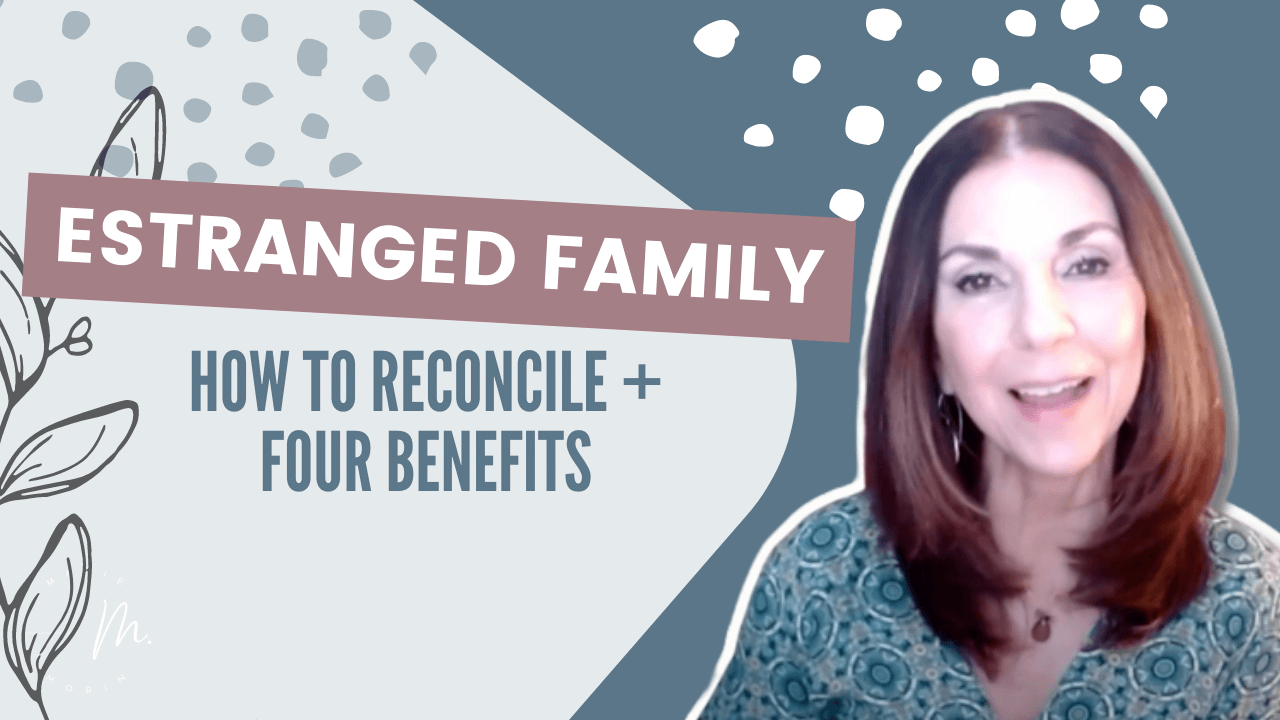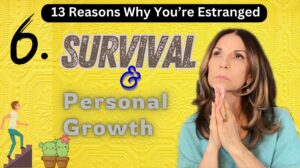Are you thinking about reconciling but wonder what it will mean for you?
According to dr. Karl Pillemer, author of Fault Lines Fractured Families and How to Mend, states there are four benefits to reconciling. Reconcilers noted the critical benefits of avoiding regret, getting back into the family, accessing resources, and a shared lifetime. In families where there is extreme harm done to one or more members, such as abuse, reconciliation is not possible, nor is it recommended. Estrangement, in this case, is necessary and a form of self-preservation. Reconnecting is a courageous act for individuals who can reconcile and desire a new relationship. This article discusses the four benefits and How to Reconcile With Estranged Family Members.
Pillemer interviewed 270 estranged individuals, with 100 recounting their experience of reconciling. Reconcilers reported the following similar themes in their decision to reconcile.
Four Benefits of Reconciling When Estranged
1. Avoiding regret
According to Dr. Karl Pillemer, people he spoke to told him the idea of anticipated regret prodded them. What will it feel like if I don’t try and reconcile?
It is different from thinking of what life would have been like if you hadn’t done something. Anticipatory regret is the act of stepping into the future and anticipating how you will feel if you either do or don’t do a particular action. In essence, it is avoiding future regret.
They also began thinking about what they would feel like if something happened to their loved ones and didn’t try to reconcile. They pondered, “Will I be consumed with regret if I wait until it’s too late?”
2. Getting Back Into The Family
When there’s estrangement in a family, typically, other family members take sides. Some factions occur with the rift becoming more than the original members involved in the parting. In taking sides, the split becomes not only with the one family member but also the separation of relationship with the others. A ripple effect impacts the concern of getting together becoming an ordeal. Family meetings may cause anxieties over the possibility of arguments and meltdowns. According to those Pillemer interviewed, once there was reconciliation, other family members in time softened, and shared occasions were less stressful.
They achieved the optimal goal of getting back into the family. Naturally, some family members may hold onto grudges. However, the overall experience was a unified family once again.
3. Access to Resources
Estrangement freezes the relationship in time. The estrangement condition entails the breaking of emotional connection. Individuals stop talking and, in many cases, stop seeing each other. In addition to the absence of contact, the estranged now lack support when needed. Healthy families care with their actions of helping. Assistance can also be in the form of an exchange of information. For example, if your sister, the nurse, is no longer estranged, you are free to call her and ask for her expertise about something you are now facing.
Family resources include conversations and emotional and time support. Healthy families enjoy interpersonal relationships; they are loyal, share a commitment to the family unit, and are supportive. Typical families have arguments and are not perfect. They rally together in times of need and choose to trust each other to have the other’s back. Family therapy is an excellent means to allow members to be heard and work out their differences while the family is intact. In cases of estrangement, hashing out hurt feelings and pointing to harmful actions is counterproductive to reconciling.
Pillemer describes the story of one sister reconciling with her sister. Shortly after, one of the sisters needed help after being hospitalized. Her sister had stepped into the newly restored relationship, supporting and assisting her by being present.
4. A Shared Lifetime
When you are cut off, you miss out on occasions such as birthdays, weddings, and the birth of a new baby. The time lost includes the sharing of small and meaningful events. Successful reconcilers spoke of the transformative effect reconciliation had on them individually. Reconcilers were changed because they chose to create a new relationship; they abandoned the need to go back into the past and hash out old grievances, left the need for an apology, and lived life forward.
They found a new shared lifetime that includes being emotionally connected with their loved ones. They found pleasure and enjoyment in a new shared future they had not anticipated. People who reconciled did it first for themselves; they avoided anticipatory regret, gained access to interpersonal resources, and created a new relationship with a shared lifetime.
Each story is indeed complicated, having so much going on. The stress and pain estrangement causes are immense. Reconciling is a courageous act that requires preparation and intention. Many estranged individuals have tried to reconcile, and their attempt was refused. It is possible that your family member is not ready and will not want to communicate. Those Pillemer interviewed found that they received personal therapy, learned communication skills, and focused on caring for themselves before they acted. Reconcilers also reported that circumstances with their loved ones had changed.
To reconcile is to make amends, settle a dispute, and call for a cease-fire. Often there is no way to reconcile the two versions, and reconciliation is accepting that fact. Reconcilers of estrangement were willing to relinquish needing to win their point. To reconcile when two opposing viewpoints relate to one’s resigning, the need for both sides to agree on one narrative.
A considerable obstacle when considering reconciling is the insistence that the other party listens and agrees with your version of the past. Indeed, both parties’ versions are valid and deserve attention. Estrangement is complex and filled with versions tied to painful histories.
Many threads within a family rift may include divorce, emotional abandonment, alienation, mental illness and substance use, and long-standing poor communication. The differing threads of the dark tapestry being cut off participate in its design.
To reconcile, one must focus not on the threads that created the mess but on what the new relational tapestry will reveal.
According to dr. Karl Pillemer, author of Fault Lines Fractured Families and How to Mend, states there are four benefits to reconciling. Reconcilers noted the critical benefits of avoiding regret, getting back into the family, accessing resources, and a shared lifetime. In families where there is extreme harm done to one or more members, such as abuse, reconciliation is not possible, nor is it recommended. Estrangement, in this case, is necessary and a form of self-preservation. Reconnecting is a courageous act for individuals who can reconcile and desire a new relationship. This article discusses the four benefits and How to Reconcile With Estranged Family Members.
Get The eBook: Feeling Heartbroken and Alone? How to Pick Up the Pieces When You are Estranged.
Resources:
- Agllias, Kylie. Family Estrangement A Matter Of Perspective. New York, Routledge, 2017.
- Coleman, Joshua. Rules of Estrangement. New York, Harmony Books, 2020.
- Morin, Marie. Feeling Heartbroken and Alone? How to Pick Up the Pieces When You are Estranged. eBook. 2022.
- Morin, M.L. [Morin Holistic Therapy]. (2022, January 4 ). What is Family Estrangement? You Are Not Alone.
- Morin, M.L. [Morin Holistic Therapy]. (2021, September 8). Diaphragmatic Breathing: 5 Minute Deep Breathing Exercise for Beginners.
- Morin, Marie. How to Deal with Estranged Family During the Holidays (2021, November 21) Sixty and Me. https://sixtyandme.com/estranged-family-holidays/
- Pillemer, Karl. Fault Lines Fractured Families and How to Mend Them. New York Penguin Random House, 2020.





